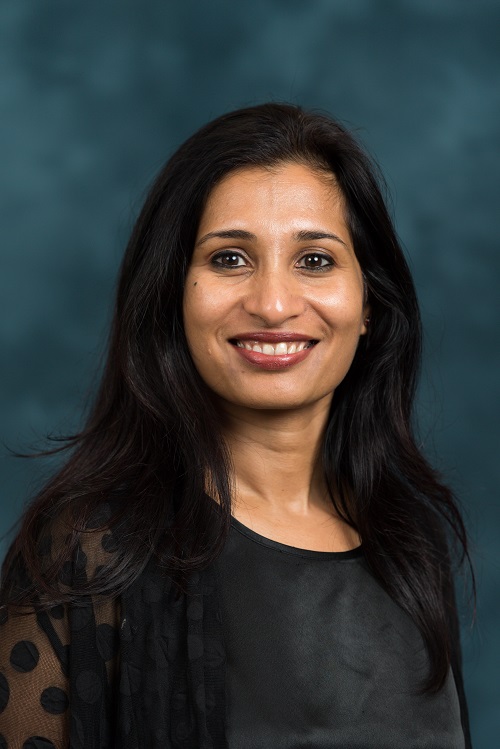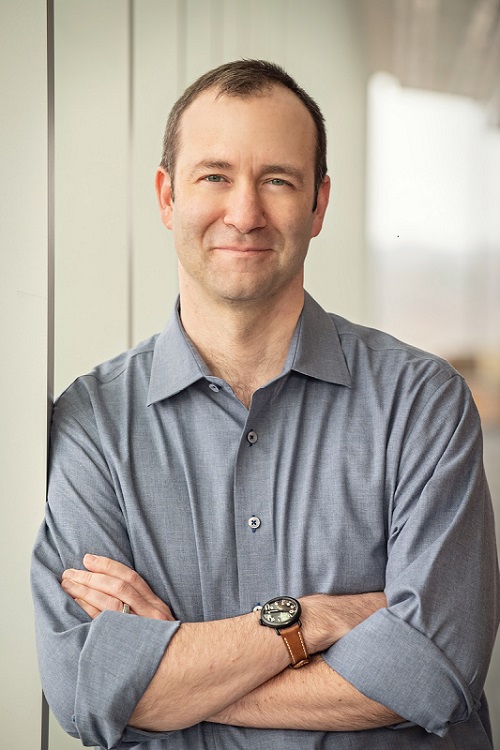Rogel Cancer Center names new associate directors for data and population sciences
Media contact: Nicole Fawcett, 734-764-2220 | Patients may contact Cancer AnswerLine 800-865-1125
Bhramar Mukherjee to take new role over quantitative data sciences; Chris Friese named to cancer control and population sciences
ANN ARBOR, Michigan — The University of Michigan Rogel Cancer has named two new associate directors.
Bhramar Mukherjee, Ph.D., will be the associate director for quantitative data sciences, and Christopher Friese, Ph.D., R.N., was named associate director for cancer control and population sciences.
Mukherjee, chair and John D. Kalbfleisch Collegiate Professor of Biostatistics at the U-M School of Public Health, previously led cancer control and population sciences at the Rogel Cancer Center. She is stepping down from that position to take over leadership around quantitative data science efforts within cancer research. This is a new position that recognizes the expanding role of data science in cancer research.Friese, Elizabeth Tone Hosmer Professor of Nursing at the U-M School of Nursing, will lead the center’s efforts around cancer screening, detection and prevention, as well as research on cancer outcomes, disparities and new models of cancer care delivery.
“Dr. Mukherjee and Dr. Friese are both outstanding scientists and leaders in their fields. Our members already have tremendous strength in quantitative data sciences and cancer control and population sciences,” says Eric R. Fearon, M.D., Ph.D., director of the Rogel Cancer Center.
“With the vision of our new leaders, I look forward to further innovation and impact in cancer control and population sciences and in quantitative data science, including new scientific insights and ultimately improved outcomes for people who have cancer or were treated for cancer.”
Mukherjee joined the University of Michigan faculty in 2006. She received her doctorate in statistics from Purdue University, where she also earned a master’s of science in mathematical statistics. She holds a master’s degree in applied statistics and data analysis from the Indian Statistical Institute.
Her principal research interests lie in the intersection of genetic and environmental epidemiology. Cancer research interests include penetrance estimation in high risk cancer families, studies of gene-environment interaction, characterizing and distinguishing molecular sub-types of cancer and joint analysis of electronic health records and genomics data with a focus on cancer outcomes.Mukherjee’s role recognizes the increasing role of Big Data in cancer research. She will lead efforts to bolster resources around biostatistics, bioinformatics, biomathematics, computational biology and other approaches as they relate to cancer research. She will also develop workshops and training modules to improve investigators’ understanding of the rapidly expanding impact of data sciences.
“There are tremendous opportunities, both within the University of Michigan and nationally around Big Data,” Mukherjee says. “In cancer, we are gathering complex data from various domains, including genetics, lifestyle and behavioral factors. By using data in research in a principled way, we can pinpoint potential targets for prevention and treatment or identify trends that could help improve how we deliver cancer care. I look forward to working with Rogel members and others throughout the university to explore how our breadth and depth of expertise around data science can benefit cancer research and enhance scientific reproducibility and rigor.”
Friese, who is also a professor of health management and policy at the U-M School of Public Health, received a bachelor’s and doctorate in nursing from the University of Pennsylvania School of Nursing and completed a three-year postdoctoral fellowship in cancer control and outcomes at Harvard University/Dana-Farber Cancer Institute. He has practiced as a staff nurse at leading cancer centers, including the University of Pennsylvania, Johns Hopkins Hospital and the Rogel Cancer Center.
Friese is a national expert in the analyses of claims data to study care quality and has executed large surveys of ambulatory oncology nurses. He leads an interdisciplinary research program to study the quality of care delivered in understudied ambulatory oncology settings from the perspectives of patients and clinicians. In 2018, Friese was appointed to a six-year team on the Patient-Centered Outcomes Research Institute (PCORI) Board of Governors.
As associate director, he will provide strategic direction for the center’s two cancer control and population sciences research programs, which focus on cancer epidemiology and health outcome and behaviors.
“Dr. Mukherjee's exceptional leadership of cancer control and population sciences galvanized our scientific community and assures a bright future for Rogel Cancer Center scientists in this field,” Friese says.
“The depth and breadth of cancer control activities at the Rogel Cancer Center provides us with the opportunity and obligation to reduce the burden of cancer. I look forward to working with my colleagues on supporting their efforts to tackle the vexing challenge of cancer control across the continuum, from prevention and early detection to survivorship.”
The appointments were effective Jan. 1, 2020.


